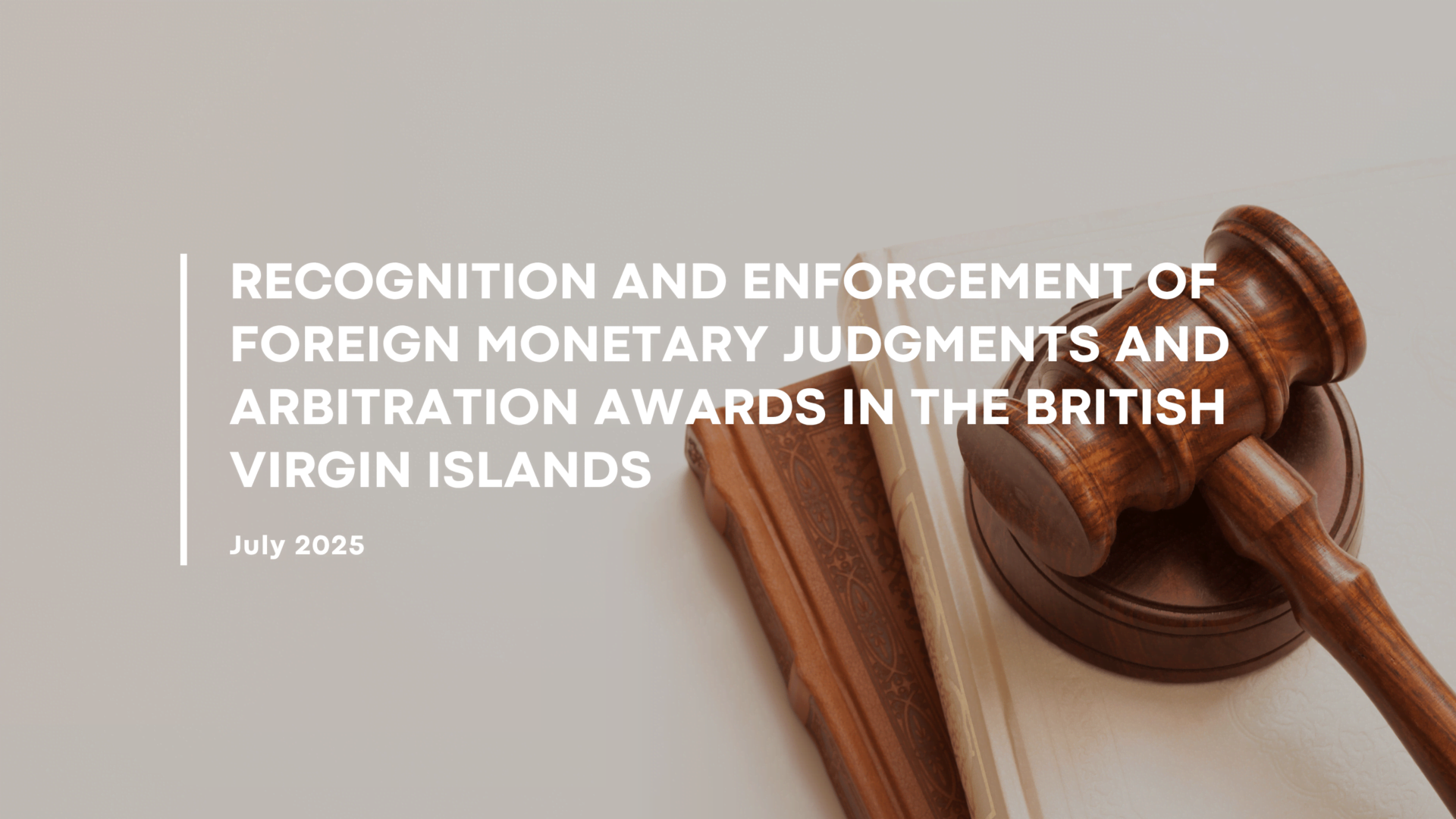This website uses cookies for technical and other purposes as specified in the cookie policy. We'll assume you're ok with this, but you can opt-out if you wish. Read More
Recognition and Enforcement Of Foreign Monetary Judgments And Arbitration Awards In The British Virgin Islands
23 July 2025
A. Registering Foreign Monetary Judgments
In the British Virgin Islands (“BVI”), the Reciprocal Enforcement of Judgments Act 1922 (“1922 Act”), along with common law, govern the enforcement of foreign monetary judgments. The 1922 Act provides a streamlined process for registration of foreign monetary judgments from a specified 15 jurisdictions, including England & Wales, Northern Ireland, Scotland, and several Caribbean/Commonwealth countries.
The foreign monetary judgment must be registered within 12 months of the date of the judgment, unless there are special circumstances justifying the delay. In registering the foreign monetary judgment, the BVI courts will look to whether the originating court had jurisdiction over the subject matter, and that the debtor was properly served. Furthermore, the BVI courts will need to see that the foreign monetary judgment is for a fixed and definite sum, and that the judgment must be final and conclusive. Lastly, the registration of the foreign monetary judgment must not be against public policy. The foreign monetary judgment registered before the BVI courts will have the same force and effect as if it was originally obtained in the BVI.
B. Common Law Debt Claim
On the other hand, monetary judgments that are not originated from one of the 15 jurisdictions listed in the 1922 Act cannot be registered in the BVI, but can still be enforced if the judgment creditor commences a claim under the cause of action for debt. The judgment creditor must commence a debt claim against the debtor in the BVI within 12 years of the foreign judgment being enforceable. It is also important to note that in order to make a claim on interests accumulated on the debt, there is a time limit of six years. In other words, you cannot claim interest that became due more than six years before the date you commence the suit in the BVI. However, you can still claim the principal amount of the 2 debt. The same principles from the previous paragraph applies – courts will look at the finality of the judgment, as well as the certainty of the sum of the debt.
C. Recognising and Enforcing Arbitral Awards
The Arbitration Act 2013 (“Arbitration Act”) based on the UNCITRAL model law governs the enforcement of arbitration awards in the BVI. The BVI is a party to the Convention on the Recognition and Enforcement of Foreign Arbitral Awards 1958 (“New York Convention”), enhancing the BVI’s status as an arbitration friendly jurisdiction with a clear framework for recognition and enforcement of foreign arbitral awards. For Convention Awards (i.e., one made in a New York Convention jurisdiction), they may be enforced in the BVI through either commencing a new action before the court or applying for the leave of the court to enforce the award directly.
On the other hand, a non-Convention Award (i.e., one not covered by the New York Convention) can only be enforced in the BVI by applying for leave of the court. The procedure to enforce either type of award is largely the same. The claimant must include in his application a certified copy (or the original) of the arbitral award, and a certified English translation if necessary, as well as a certified copy (or the original) of the arbitration agreement, where applicable. The claim form must be served on the award debtor. If the debtor is located outside the BVI, service must be effected out of the jurisdiction.
D. Enforcement Methods
Once a foreign judgment or arbitral award is recognised or enforced in the BVI and becomes a local judgment, it can be enforced through various court remedies, including charging orders, garnishee orders, judgment summons, and orders for seizure. Practically speaking, enforcement is only effective where the judgment debtor has assets in the BVI. Most often, this is in the form of shares in a BVI company. The usual enforcement method is to seek a charging order over the debtor’s shares. Another method to enforce against a BVI company is to wind up the company. A judgment creditor may apply to wind up a BVI company if the foreign judgment or arbitral award remains unpaid.
E. Singapore Judgments and Enforcement in the BVI
Judgments and arbitral awards obtained in Singapore may be enforceable in the BVI, subject to the legal framework as mentioned above. While Singapore is not one of the 15 recognised jurisdictions under the 1922 Act, the Singapore court judgments may still be recognised and enforced in the BVI at common law, provided they are final and conclusive, for a definite sum of money, and not contrary to BVI public policy. The BVI courts will also assess whether the Singapore court had proper jurisdiction over the defendant and whether the judgment was obtained without fraud or breach of natural justice.
For arbitral awards, both Singapore and the BVI are parties to the New York Convention, and as such, Singapore-seated arbitration awards are generally enforceable in the BVI pursuant to the Arbitration Act. The BVI commercial courts have a well-established practice of recognising foreign awards and judgments, including those from leading common law jurisdictions, reinforcing the BVI’s reputation as a pro-enforcement jurisdiction. Strategic considerations such as whether the debtor holds shares in BVI companies or other BVI-based assets often drive enforcement proceedings in the BVI following Singapore proceedings.
© PDLegal LLC
This article is intended to provide general information only and does not constitute legal advice. It should not be used as a substitute for professional legal consultation. We recommend seeking legal advice before making any decisions based on the information available in this article. PDLegal fully disclaims responsibility for any loss or damage which may result from relying on this article.
Further information
Should you have any questions on how this article may affect you or your business, please get in touch with the following persons:
Contributed by:
Gerard Quek
Group Deputy Managing PartnerChambers & Partners – Asia Pacific 2023
PDLegal LLC is pleased to announce that Managing Partner, Peter Doraisamy, has been recognised and ranked by Chambers & Partners (Asia Pacific 2023 for Shipping: Domestic: Litigation). The following quotes appear with Peter’s ranking: –
“Peter Doraisamy of PDLegal in Singapore is a noted shipping lawyer in the market. He handles a wide range of disputes, including ship grounding, cargo and fraud-related cases” – Chambers & Partners – Asia Pacific 2023
“He is excellent in litigation. He has very good control of the case, collecting the right evidence and putting this into a very successful trial.” – Shipping Litigation Client
Chambers and Partners is the leading independent professional legal research company operating across 200 jurisdictions. Chambers and Partners delivers detailed rankings and insights into the world’s leading lawyers and law firms.
This ranking is a testimony to the expertise and experience of the Firm’s shipping practice and would not be possible without the support of our clients and friends.
View All Awards

We’re here to help you.
Whether you're seeking advice, representation, or have general inquiries, we're here to help. if you would like to speak to us for more information, please contact our client services team who will be happy to assist.
Let's Get In Touch
Our Office
- A:
PDLegal LLC Advocates & Solicitors 1 Coleman Street #08-02 The Adelphi Singapore 179803
- E:
- T:
- F:
(65) 6220 0392
- H:
Mon - Fri : 9:00 am - 5:00 pm Sat : 8:30 am - 12:00 pm










